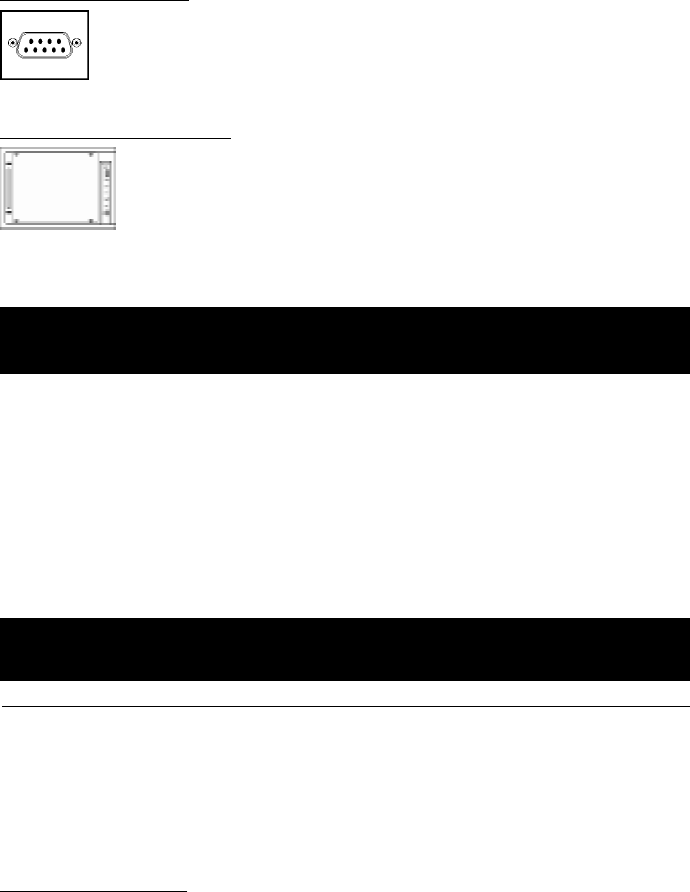
6
“SMART” RS-232 Port
The RS-232 port connects your UPS to any workstation or server. Use with Tripp Lite
software and included cable to monitor and manage network power and automatically
save open files and shut down equipment during a blackout. This port uses RS-232
communications to transmit UPS and power conditions (Pin 7 = Transmit; Pin 8 =
Common; Pin 9 = Receive). Contact Tripp Lite Customer Support for more information
and a list of available SNMP, network management and connectivity products.
Battery Replacement Door
Under normal conditions, the original batteries in your UPS will last several years.
Battery replacement should only be performed by qualified service personnel. Refer
to “Battery Warnings” in the Safety section on page 2. When replacing batteries,
qualified service personnel should follow this procedure: 1) turn UPS OFF; 2) remove
the battery door located on the front panel; 3) pull batteries partially out of the case;
4) make a detailed sketch of the batteries and the polarity, color and connection of all
cables; 5) disconnect battery terminals; 6) dispose of used batteries; 7) reconnect replacement batteries
exactly as original batteries were; 8) push batteries back into case and replace cover.*
* You may not receive full runtime until your replacement batteries have fully charged.
Specifications
Storage & Service
Storage
Turn your UPS OFF: first, engage the ON/Standby Switch and release it to place your UPS in the “Standby”
mode; then set the System Enable Switch to “DISABLE”; finally, disconnect the UPS power cord from the
wall outlet. If you plan on storing your UPS for an extended period of time, recharge the UPS batteries once
every three months. Follow steps #1 and #3 in the Installation section and allow the UPS to charge from
4 to 6 hours. If you leave your UPS batteries discharged for an extended period of time, they will suffer
permanent loss of capacity.
Service
If returning your UPS to Tripp Lite, please carefully pack the UPS using the ORIGINAL PACKING MATERIAL
that came with the unit. Enclose a letter describing the symptoms of the problem. If the UPS is within the
2 year warranty period, enclose a copy of your sales receipt.
NP700RM
Output Capacity (VA/Watts): 700/450
Battery Runtime (Half Load/Full Load) Min.: 28/12
Battery Recharge Time: 2-4 hrs.
Suggested Circuit: 15 amp
Approvals: UL, cUL, FCC Class B
Input Voltage/Frequency (120V/60 Hz); On Line Input Voltage Range (87 - 140 Volts); Voltage-Regulated Output Voltage Range
(120V +/- 9%); On Battery Output Voltage Range (120V +/- 5%); Output Waveform Line Mode (filtered sinewave); Output Waveform Battery Mode
(PWM sine wave); AC Surge Suppression (exceeds IEEE 587 Cat. A & B standards); AC Noise Attenuation (>40 dB); AC Protection Modes (H to
N, H to G, N to G).
FCC Radio/TV Interference Notice
Note: This equipment has been tested and found to comply with the limits for a Class B digital device, pursuant to Part 15 of the FCC Rules.
These limits are designed to provide reasonable protection against harmful interference in a residential installation. This equipment generates,
uses and can radiate radio frequency energy, and if not installed and used in accordance with the instruction manual, may cause interference
to radio communications. However, there is no guarantee that interference will not occur in a particular installation. If this equipment does cause
harmful interference to radio or television reception, which can be determined by turning the equipment off and on, the user is encouraged to
try to correct the interference using one or more of the following measures: reorient or relocate the receiving antenna; increase the separation
between the equipment and receiver; connect the equipment into an outlet on a circuit different from that which the receiver is connected; consult
the dealer or an experienced radio/television technician for help. The user must use shielded cables and connectors with this product. Any
changes or modifications to this product not expressly approved by the party responsible for compliance could void the user's authority to
operate the equipment.
The policy of Tripp Lite is one of continuous improvement. Specifications are subject to change.


















